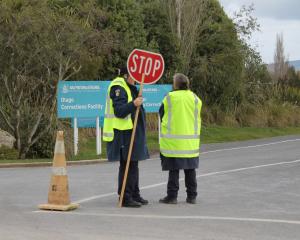A man and a woman who concealed their relationship and the premature birth and death of a baby girl five years ago were each convicted and discharged when sentenced in the Dunedin District Court yesterday.
The woman (now 23) and the man (now 30) had admitted disposing of the baby's body on or before February 5, 2011, with intent to conceal the fact of the birth.
Both defendants had sought a discharge without conviction and final name suppression.
But yesterday, public defender Catherine Ure said the woman was not pursuing her application for a discharge.
Accepting Miss Ure's submission the woman be convicted and discharged, Judge Kevin Phillips dealt with the woman in that way.
The man's discharge application, through counsel Alastair Logan, and opposed by Crown counsel Craig Power, was denied. However, of the view it would be wrong to differentiate between the two defendants, the judge also convicted and discharged the man.
And he made an order finally suppressing both defendants' names ‘‘to allow you both to move on with your lives''.
When the defendants pleaded guilty in December, the court heard they had concealed their relationship and premature birth and death of the baby because of concerns about shaming their families.
The baby was born in the mother's bedroom. It was premature and was believed to have died of respiratory complications within about two hours.
Its body was secretly buried in an unmarked grave in the backyard at the father's Oamaru home. But it was found and exhumed in September 2014 after Dunedin police began investigating the matter because of rumours circulating around the town.
Interviewed soon afterwards, the two defendants spoke freely about concealing their relationship and about their involvement in concealing the circumstances of their daughter's birth and then death.
A neonatal expert's opinion was the child was born prematurely at about 36 weeks' and most likely died of respiratory distress syndrome and hypothermia within two hours.
The expert also concluded the baby was unlikely to have survived after the mother noticed its distress, even if medical help had been sought.
Mr Logan said the man was not present at the birth and not aware of the death until some time later. His response to the situation, ‘‘a decision neither rational nor right'', was no doubt activated by panic and fear of consequences.
The man took the baby's body to his home and buried it, crying throughout. It was a relief to him when he was approached by police. He took the detective to where the baby was buried.
Miss Ure said the woman would not forget anything to do with the offending. Remarkably, she had rebuilt her life and moved on. The background to the offending was complex.
The woman had been at an age where she was not adequately educated on sexual practices such as contraception. Declining to discharge the man, Judge Phillips said the direct and indirect consequences of a conviction were not out of proportion to the gravity of the offending.
He also said the man was a number of years older than the woman. He considered the man's involvement to be the more significant of the two. Convicting and discharging the man, the judge said Miss Ure's submission that the woman be convicted and discharged was the right one. It would be wrong to differentiate between the two.
The man was entitled to be dealt with in the same way.
Neither defendant had a previous conviction.












